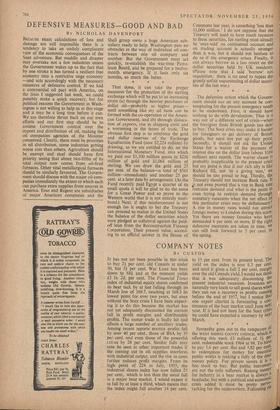DEFENSIVE MEASURES-GOOD AND BAD
BY NICHOLAS
DAVENPORT
BECAUSE exact calculations of loss and damage are still impossible there is a tendency to take an unduly complacent view of the economic consequences of the Suez adventure. But muddle and disaster may overtake not a few industries unless the Government wakes up to the fact that by one stroke it has turned a resilient free economy into a restrictive siege economy —and acts accordingly with the necessary measures of defensive control. If we had a commercial oil pact with America, on the lines I suggested last week, we could possibly make a quick recovery, but for Political reasons the Government in Wash- ington is not willing to help us at this stage and it may be a long time before it can. We are therefore thrust back on our own efforts and our first step should he to assume Government control over the import and distribution of oil, making the oil companies agencies of the Minister concerned. Clearly, there must be priorities in• oil distribution, some industries getting worse cuts than others. Agriculture should be exempt and steel should have first priority seeing that about two-fifths of its total output now comes from oil-fired furnaces. Other vital metallurgical furnaces should be similarly favoured. The Govern- ment should discuss with the major oil com- panies immediately the extent to which each can purchase extra supplies from sources in America. Esso and Regent are subsidiaries of major American companies and the
Shell group owns a huge American sub- sidiary ready to help. Washington puts no obstacles in the way of individual oil con- tracts between one oil company and another. But the Government must act quickly, re-establish the war-time Petro- leum Board, and be prepared for a twelve- month emergency. If it lasts only six months, so much the better.
* That done, it can take the proper measures for the protection of the sterling exchange which will be put to 'an increasing strain (a) through the heavier purchases of dollar oil—probably at higher prices— until something like my oil bank can he formed with the co-operation of the Ameri- can Government, and (b) through disloca- tion of exports, rise in shipping costs and a worsening in the terms of trade. The obvious first step is to reinforce the gold and dollar reserves of the Exchange Equalisation Fund (now $2,224 million) by drawing, as we are entitled to do, on the International Monetary Fund, into which we paid our $1,300 million quota in $236 million of gold and $1,064 million of sterling. We can draw the gold and 25 per cent. of the balance—a total of $561 million—immediately and another 25 per cent. at a later date by arrangement. (As the Fund recently paid Egypt a quarter of its small quota it will be glad to do the same for a Great Power and so prove to the Western world that it is not entirely mori- bund.) Next, if this reinforcement is not enough (as it ought to be) the Treasury can proceed to realise in the United States the balance of the dollar securities which were pledged as collateral against the paid- off loan from the Reconstruction Finance Corporation. Their present value, accord- ing to an official answer in the House of Commons last year, is something 'less than $1,000 million.' I do not suppose that the Treasury will need to have much recourse to these securities, for sterling must already be `over-sold' on continental account and on trading account is actually stronger than it was, but it should not hesitate to do so if the emergency arises. Finally, it can always borrow as a last resort on the dollar securities held by UK residents. (Please note that I said 'borrow' not requisition : there is no need to repeat the grossly unfair sequestrating of dollar securi- ties of the last war.) * * *
The defensive action which the Govern- ment should not on any account be con- templating for the present emergency needs to he underlined. First, it should have nothing to do with devaluation. That is a way out of a different sort of crisis—when the foreigner finds British goods too dear to buy. The Suez crisis may make it harder for foreigners to get delivery of British goods, but need not put up their price. Secondly, it should not ask the United States for a waiver of the payment of interest due on the dollar loan (about $104 million) next month. The waiver clause is probably inapplicable to the present crisis but my point is that if our rich ally is like Richard III, not 'in a giving vein,' We should be too proud to beg. Thirdly, the Treasury should not increase Bank rate. It is not even proved 'that a rise in Bank rate restrains demand and what is the point in even trying to restrain demand through monetary measures when the net effect of this particular crisis may be deflationary? A rise in money rates would not attract foreign money to London during this scare. Yet there are money fanatics who have demanded 6 per cent. or more. If the right defensive measures are taken in time, we can still look forward to 5 per cent. in the spring.










































































 Previous page
Previous page